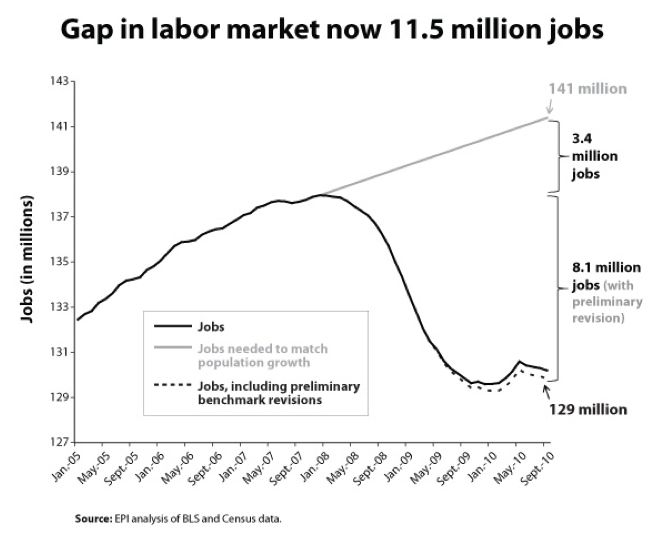Well obviously when the government is just a front for the executives of large corporations making most of the most important decisions, then the government will repeatedly get unfairly tagged as a failure when corporate executives prove unable to correctly manage an economy and a country.
Thus the reinforcing cycle of idiocy that has gone on in the United States in recent decades. The large corporation executives have proven to be not up to the task of competently governing, but the average fool in the US has concluded that it was the government responsible for those failures.
And unlike in the reputable countries, in some such as Japan and France more so than others, you can NOT in the US work only in Government and make as much money as you can in the private sector. So where is the incentive in the US for the best and brightest to work in government? It's largely nowhere.
Everyone needs to keep reminding themselves that a lot of "government policy" that exists right now is actually "large corporation executives" policy.
The health "reform" that Obama is threatening Americans with is of course another example of this.
[The above was in response to
this article.]
A COUNTERPOINT
pjd412 August 18th, 2009 12:11 pm
Pay isn't what attracts the best and brightest. Was Einstein in it for money? How about Mozart? Martin Luther King? Even a number of 19th-20th century inventors were clearly after something other than getting rich. The idea that talent and motivation arises from a desire to get rich is a dreadful myth of the corporate capitalists to justify absurd levels of compensation to people who are basically uneducated, and who's only qualification is ruthlessness.
I am a federal employee, and most federal scientific and engineering jobs in science and engineering are pay-and benefit competitive with the private sector - but in cases where they are lower, many scientists and engineers prefer government work because they can pursue advancement of knowledge (where I work, mine safety and health) without the constant pressure of having to show one's worth in a profit making system. Increasingly even academia is subjected to these pressures.
And I can assure you, from the designs I review from private sector engineers every day, our engineers here more current and competent than any of those in the private sector - even when the millionaire principal and owner of the firm did the designing!
Of course there are exceptions, but in economics you first look at tendencies, patterns, majorities, causes, and effects; you don't look at the exceptions unless you are spending a lot of time on the subject.
The top tiers of the US private sector are grossly over payed and the US federal government does not even pretend to be able to be competitive with those pay packages anymore. In the US and throughout the world, in some places more so than in other places, pay is often what attracts the best and the brightest. Not always, but often enough so that if government pay is uncompetitive, you have a real problem, which the US clearly does.
Oh, and don't get confused...
At the middle class level, you will actually probably make more over a lifetime working for the government compared to working in the private sector. The reason is that for pay grades below a quarter of a million dollars a year, government pay is still competitive with private pay, and on average you will be layed off much less of the time while working for the government compared with working in the private sector.
My original comment referred to the very highest amounts of pay in the economy.
A COUNTERPOINT:
pjd412 August 18th, 2009 2:24 pm
Please provide me with evidence that remuneration - particularly at these upper levels, correlates with talent and intelligence. I don't think you will find any. The only thing these upper-level corporate positions reward is a ruthless desire to get rich, combined with certain social skills to get there.
And I was _not_ pointing out exceptions, i was pointing out examples. I can think of NO particularly intelligent individual past or present - from Newton and Liebnitz to Bohr, Einstein, Feinman, Hawking, Higgs, Penrose, who were remunerated at anything like a corporate CEO, and conversely, I know of no corporate CEO's or billionaire, past or present, who have ever been regarded as particularly intelligent by the usual definition. None!
There is no correlation between ascendancy in a hierarchical organization and high levels of remuneration, and being the best and brightest. None!
You seem to be clinging to one of the usual unquestioned, empirically unproven assumptions that undergirds capitalism.
Well, since at least the 1960's, comparative political scientists (the ones who compare political systems internationally) have noted that government agencies in countries where government pay is fully competitive with the private sector, either across the board or at least, and more commonly, at the very highest levels of pay, are generally more efficient and more productive than are the equivalent agencies in countries where private pay exceeds public pay at the highest pay levels. In other words, only in countries where the pay at the highest levels is equal between public and private is where you find that the public agencies are not constrained, limited, or subject to being captured by the private sector, the way public agencies chronically are in the US.
I remember that clearly from my comparative politics class in University. Since I was an economics major, I never forgot that; I thought it was nice that the political science experts could "do the economics" on ocassion, especially since economists are notoriously bad at politics, laugh out loud.
Many European countries strongly believe in this theory, and in fact this is one of the biggest reasons why the near billion dollar pay packages given to some US executives are unheard of in Europe. Europeans have long since decided to effectively prevent obscene pay packages from appearing by having punitive tax rates on salaries above roughly 3 million dollars a year.
Most Western and Northern European countries do not want to end up with a government work force, at any level including the very highest, which may be inferior in any way, shape, or form to the work force of the private sector. The US clearly does not agree that this is a high priority.
I didn't mean to imply that there is a strong correlation between intelligence and pay anywhere, in France, the US, or anywhere else. There is clearly some correlation, but I most definitely agree with you that the correlation is not all that strong at the higher pay levels.
Aside from the wrong impression that was created, my wording was a little too storng for the point I was actually trying to make, which can happen sometimes. I'll change my wording:
Original, too strong and with the wrong impression: "So where is the incentive in the US for the best and brightest to work in government? It's largely nowhere."
Correction: "So where is the incentive in the US for the best and brightest to work in government? It's there to some degree, but it could be a bigger and more reliable incentive if obscene private sector pay packages were phased out.
We inadvertently stumbled upon something very interesting.
While economists and smart people in general are often aware that there is surprisingly low correlation between pay and intelligence, the average young person who is choosing a profession often assumes a much stronger correlation than what exists. There is some propaganda involved there. And there is also the ever present connection in the minds of young people between the need to be smart to get a college degree, and the higher pay that supposedly results from getting a college degree.
Therefore, it is important that obscene private sector pay packages be prevented from appearing in an economy, because if they do, too many people, especially young people, and including intelligent young people, will be fooled into thinking that "less intelligent people" go into Government, which obviously will lead eventually to the Government agencies being, to one extent or another, limited, compromised, and captured by the private sector.
Keep in mind that how "strong" government agencies are is not merely an academic topic. It can be a very crucial factor indeed. For example, almost everyone agrees that the US government regulators of the US financial system were compromised or captured outright by the huge banks and investment companies, and that this was one of the big reasons for the economics emergency and the subsequent and ongoing economics collapse.
A RESPONSE:
pjd412 August 18th, 2009 5:43 pm
Thanks for your clarification. I agree that in the US, government service must constantly deal with torrents of negative propaganda from the corporate community, and this is reflected in the difficulty finding talent. We have trouble finding competent experienced engineers in my agency, and have wondered how much it is due to the overall shortage of civil engineers in the US, the mistaken perception that government pay will be lower, or mistaken, negative attitudes about federal government work.
The shortage of civil engineers is itself due to it being viewed as being "unfashionable" compared to IT, law, medicine or finance, particularly among the increasingly affluent student populations that dominate even state U's. Might it be due to the perception that civil engineering is associated with public "socialistic" infrastructure?
So, I can see where getting talent in the SEC or other financial regulators is probably far more difficult.





